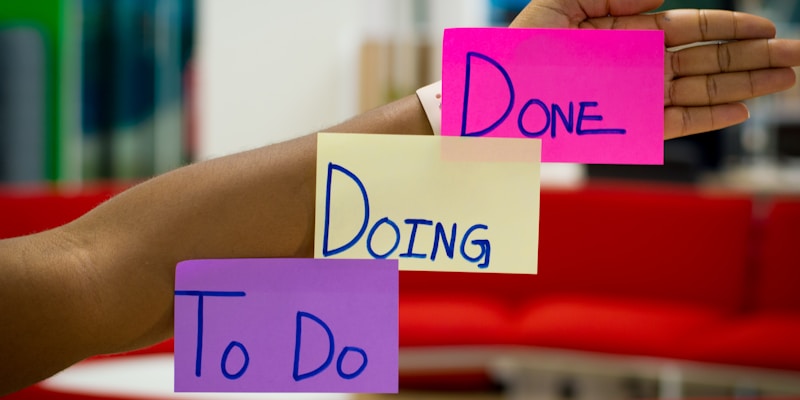
10 Productivity Tips That Actually Work in 2025
Discover evidence-based productivity strategies that go beyond the typical advice. These tips are designed for the modern remote worker.
10 Productivity Tips That Actually Work in 2025 (Unlike Your Memory)
The productivity advice landscape is more cluttered than your desk after a week of "I'll organize it tomorrow." Most tips are recycled from the pre-digital era, back when the biggest distraction was your coworker's loud typing. As we navigate an increasingly connected world where notifications multiply like rabbits, we need strategies that account for modern challenges like digital overwhelm, remote work dynamics, and the constant urge to check if someone liked your lunch photo.
Here are 10 evidence-based productivity tips that are specifically designed for today's work environment (and your goldfish-level attention span).
1. Master the Art of Digital Boundaries (AKA Phone Kung Fu)
The biggest productivity killer in 2025 isn't procrastination—it's your phone's ability to make you forget what you were doing faster than a memory-wiping ninja.
Implementation (Your Digital Dojo Rules):
- Use focus modes on your devices during deep work sessions (your phone will survive without you, we promise)
- Set specific times for checking emails and messages (resist the urge to peek every 3.7 seconds)
- Create physical boundaries by keeping work devices out of personal spaces (your bedroom doesn't need to know about your Monday morning meetings)
2. Embrace Asynchronous Communication (The Art of Not Being Available 24/7)
Real-time communication has its place, but defaulting to async can dramatically improve your focus and reduce the stress of feeling like a human ping-pong ball.
Why it works (and why your sanity will thank you):
- Allows for deeper thinking before responding (revolutionary concept, we know)
- Reduces interruptions during focused work (shocking!)
- Gives you control over when you engage with communications (like a communication sensei)
3. Use Time-Blocking, But Make It Flexible (Not Like Your Old Gym Schedule)
Traditional time-blocking often fails because it's more rigid than a robot doing yoga. Modern time-blocking needs to account for the unpredictable nature of knowledge work and your tendency to underestimate how long everything takes.
The flexible approach (for us mere mortals):
- Block time in 90-minute chunks (aligned with natural energy cycles, not your caffeine crashes)
- Leave 25% of your day unscheduled for unexpected priorities (because life loves plot twists)
- Use color-coding to quickly identify different types of work (make it pretty, your brain likes pretty things)
4. Implement the "Two-Minute Rule" with a Twist (The Memory Warrior Edition)
David Allen's two-minute rule is classic, but it needs an update for our distraction-heavy environment where we can forget what we were doing mid-sentence.
The 2025 version (for scattered brains):
- If it takes less than two minutes AND it's related to your current context, do it now
- If it's unrelated to your current focus, add it to a "quick wins" list for later (resist the shiny object syndrome)
- Batch process your quick wins during designated times (like a productivity ninja with a to-do list)
5. Practice Strategic Procrastination (Yes, We're Giving You Permission)
Not all procrastination is bad. Sometimes your brain needs time to process complex problems in the background while you pretend to organize your desk for the fifth time today.
How to do it right (without feeling guilty):
- Procrastinate on tasks that require creative thinking (your subconscious is working, honest!)
- Set a deadline for when procrastination ends (no infinite scrolling allowed)
- Use the time for lower-stakes activities that still move you forward (productive procrastination is a thing)
6. Build Energy Management Into Your System (You're Not a Robot, Despite What Your Calendar Thinks)
Productivity isn't just about time—it's about managing your energy throughout the day instead of running on fumes and spite.
Energy optimization strategies (for humans, not machines):
- Track your energy levels for a week to identify patterns (spoiler: you're probably not a morning person)
- Schedule your most important work during peak energy hours (when you're actually functional)
- Use low-energy periods for administrative tasks (perfect for when your brain feels like mush)
7. Create Friction for Distractions (Make Bad Choices Slightly Annoying)
Make it slightly harder to access distracting websites and apps. Even small amounts of friction can help you make better choices, like a gentle nudge from your future self.
Simple friction techniques (that actually work):
- Log out of social media sites after each use (yes, every single time)
- Use app blockers during focused work sessions (your willpower needs backup)
- Keep your phone in another room during deep work (out of sight, out of mind, out of trouble)
8. Use the "Good Enough" Principle (Perfectionism is Not Your Friend)
Perfectionism is the enemy of productivity and the best friend of procrastination. Learning when something is "good enough" can free up enormous amounts of time and mental energy for things that actually matter.
Guidelines for "good enough" (without settling for garbage):
- Ask: "What's the minimum viable version of this?" (not "what would win a Nobel Prize?")
- Set quality standards upfront and stick to them (resist the urge to polish the doorknob while the house burns down)
- Remember that done is often better than perfect (and definitely better than not done at all)
9. Batch Similar Tasks (Stop Playing Mental Ping-Pong)
Context switching is expensive for your brain and about as efficient as changing clothes every five minutes. Batching similar tasks together reduces the mental overhead of constantly switching gears.
Effective batching categories (for maximum brain efficiency):
- Communication (emails, messages, calls - all the people stuff)
- Creative work (writing, designing, brainstorming - when you need your genius brain)
- Administrative tasks (scheduling, filing, planning - the necessary evils)
- Learning and research (feeding your brain new information)
10. Build Recovery Into Your Schedule (Rest is Not Optional)
Productivity isn't sustainable without recovery, despite what hustle culture wants you to believe. Build rest into your system, not as an afterthought, but as a core component of actually getting things done.
Recovery strategies (for sustainable humans):
- Take micro-breaks every 45-60 minutes (your brain needs to breathe)
- Schedule one full day off per week with no work-related activities (revolutionary, we know)
- Practice saying no to commitments that don't align with your priorities (it's a superpower, not rudeness)
The Meta-Tip: Start Small (Don't Try to Become a Productivity Superhero Overnight)
The biggest mistake people make with productivity advice is trying to implement everything at once, like attempting to learn martial arts by fighting ten ninjas simultaneously. Pick one or two tips that resonate with you and focus on those for at least a month before adding more.
Remember: the goal isn't to become a productivity machine that never sleeps. It's to create more space in your life for the things that truly matter to you (like actually enjoying your coffee instead of chugging it while running to your next meeting).
Your Turn (Time to Stop Reading and Start Doing)
Which of these tips do you think would have the biggest impact on your productivity? Start there, and remember—consistency beats intensity every time (like a steady drip that eventually fills a bucket, not a fire hose that floods everything).
The future of productivity isn't about working more hours until you become a zombie; it's about working more intentionally. These tips are designed to help you do exactly that, without losing your sanity or your sense of humor in the process.
Now stop reading productivity articles and go actually be productive. (But first, maybe set a reminder to implement one of these tips. We know how your memory works.)
